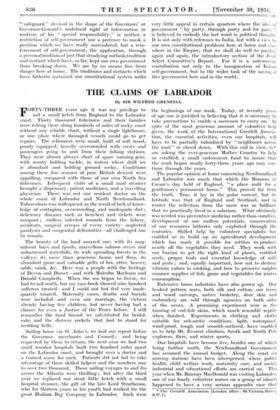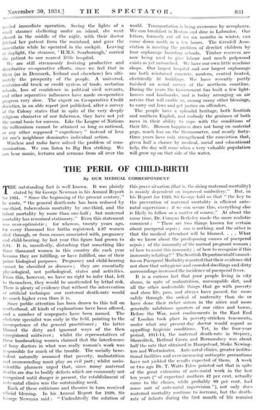THE CLAIMS OF LABRADOR
By SIR WILFRED GRENFELL
FORTY-THREE years ago it was my privilege to sail a small ketch from England to the Labrador coast. Thirty thousand fishermen and their families were fishing there, along hundreds of miles of rocky coast without any reliable chart, without a single lighthouse, or one place where damaged vessels could go to get repairs. The schooners were small, built of soft wood, poorly equipped, heavily overcrowded with crews and passengers going to and from their fishing stations. They were almost always short of spare running gear, with scanty holding tackle, in waters where drift ice is abundant and holding ground •rocky. Conditions among these fine seamen of pure British descent were appalling, compared with those of our own North Sea fishermen. Infrequent visits of a small mail steamer brought a dispensary, patent medicines, and a travelling physician. There was not one resident doctor on the whole coast of Labrador and North Newfoundland. Tuberculosis was widespread, as the result of lack of know- ledge of contagion, oVercrowding, and inadequate diet ; deficiency diseases such as beri-beri and rickets were rampant ; endless infected wounds from the fishery, accidents, surgical arrears of every variety—neglected paralyses and congenital deformities—all challenged one to remain.
The beauty of the land amazed one, with its mag- nificent bays and fjords, marvellous salmon rivers and unharnessed waterfalls, its wide spreading forests in the valleys, its more than generous fauna and flora, its abundant game and valuable pelts of fox, otter, beaver, sable, mink, &c. Here was a people with the heritage of Devon and Dorset—and with Malcolm Macleans and Donald Campbells. When the sea began to freeze, we had to sail south, but my case-book showed nine hundred sufferers. treated—and I could not but feel very inade- quately treated. Maternity cases, deaths and burials were included—and even one marriage, the victims already having five children, but never having had a chance for even a Justice of the Peace before. I still remember the hard biscuit we suktituted for bridal- cake and the distress rockets that had to stand for wedding bells.
Sailing home via St. John's, we -laid our report before the Governor, merchants and Council ; and being requested by them to return, the next year we had two small wooden hospitals built two hundred miles apart on the Labrador coast, and brought over a doctor and a trained nurse for each. Patients did not fail to take advantage of these skilled helpers and the numbers rose • to over two thousand. Those sailing voyages to and fro across the Atlantic were thrilling ; but after the third year we replaced our stout little ketch with a small hospital steamer, the gift of the late Lord Strathcona, who for thirteen years in his youth. had worked for the great Hudson Bay Company in Labrador. Stich were the beginnings of our work. Today, at seventy years of age one is justified in believing that it is necessary to take precautions to enable a successor to carry on. In spite of the most generous amount of volunteer help given, the work of the International Grenfell Associa- tion, the essential activities, even our hospitals, will have to be partially subsidized by " neighbours across the road" or cloSed down. With this end in view, we* are asking the ever-generous Mother Country to help us establish a small endowment fund to insure that the work begun nearly forty-three years ago may con- tinue through the years.
The popular opinion at home concerning Newfoundland and Labrador was much that which the Romans of Caesar's day held of England, " a place unfit for a gentleman's permanent home." This proved far from the truth. True, it lay in the polar current, but its latitude was that of England and Scotland, and in winter the reflection from the snow was so brilliant that we practically lived in a solarium. What obviously was needed was preventive medicine rather than curative, development of our endless potentials, conservation of our resources hitherto only exploited through the centuries. Skilled help by volunteer specialists has enabled us to build up an agricultural development which has made it possible for settlers to produce nearly all the vegetables they need. They work with our bureau to get the right kind of plants, certified seeds, proper tools and essential knowledge .of. soils and pests ; and, equally important, how not to destroy vitamin values in cooking, and how to preserve surpluS summer supplies of fish, game and vegetables for winter consumption.
Extensive home industries have also grown up. Our hooked pattern mats, both silk and cotton, our ivory and wood carvings, native basketry, deer skin and embroidery are sold through agencies on- both sides of the ocean. A promising experiment now is the tanning of cod-fish skins, which much resemble reptile when finished. Experiments in clothing and cloths suitable for sub-arctic conditions, light, waterproof, wind-proof, tough and smooth-surfaced, have enabled us to help Mt. Everest climbers, South and North Pole explorers, fliers, and winter sports..
Our hospitals have become five, besides one of which being further south, the Newfoundland Government has assumed the annual budget. Along the coast six nursing stations have been interspersed, where public health, child welfare work, maternity care, and social, industrial and educational efforts are carried on. This year when Mr. Ramsay MacDonald was visiting Labrador, one of our lonely volunteer nurses on a group of islands happened to have a very serious appendix case that
* The Grenfell Association (London office : 66 Victoria Street, S.W.1).
needed immediate operation. Seeing the lights of a small steamer sheltering under an 'island, she went aboard in the middle of the night, with their doctor fetched her patient from the mainland, and gave the anaesthetic while he operated in the cockpit. Leaving at daylight, the steamer, H.M.S. Scarborough,' carried the patient to our nearest little hospital.
We are still strenuously fostering productive and distributive co-operative efforts, since we feel that in them (as in Denmark, Iceland and elsewhere) lies ulti- mately the prosperity of the people. A universal, centuries-old truck or credit system of trade, sectarian schools, loss of confidence in political civil servants, and other separative influences have made co-operative progress very slow. The expert on Co-operative Credit Societies, in an able report just published, after a survey of the Colony states that in spite of the very deeply religious character of our fishermen, they have not yet the moral basis for success. Like the League of Nations the millennium cannot be attained so long as national, or any other supposed " expediency " instead of love for one's neighbour dominates individual action.
Wireless and radio have solved the problem of coin- numication. We can listen to Big Ben striking. We can hear music, lectures and sermons from all over the world. Transportation is being overcome by aeroplanes. We can breakfast in Boston and dine in Labrador. Our letters, formerly cut off lOr six months in winter, can come down north in a few hours. The Grenfell Asso- ciation is meeting the problem of derelict children by four orphanage boarding schools. Timber reserves arc now being used to give labour and much pulpwood exists as yet untouched. We have our own little machine shops. Our largest hospital and our largest orphanage are both reinforced concrete, modern, central heated, electrically lit buildings. We have recently partly finished an aerial survey of the northern coastline. During the years the Government has built a few light- houses and landmarks, and is today arranging an air .service that will enable us, among many other blessings, to carry out laws and get justice on offenders.
The people have a splendid heritage, both Scottish and southern English, and embody the geniuses of both races in their ability to cope with the conditions of their life. Human happiness does not hang on material pegs, much less on the thermometer, and nearly forty- three years have only strengthened the conviction that, given half a chance by medical, social and educational help, the day will conic when a very valuable population will grow up on that side of the water.











































 Previous page
Previous page